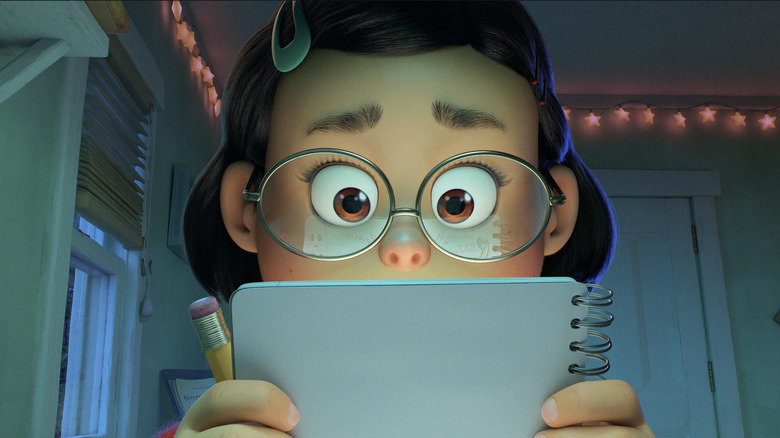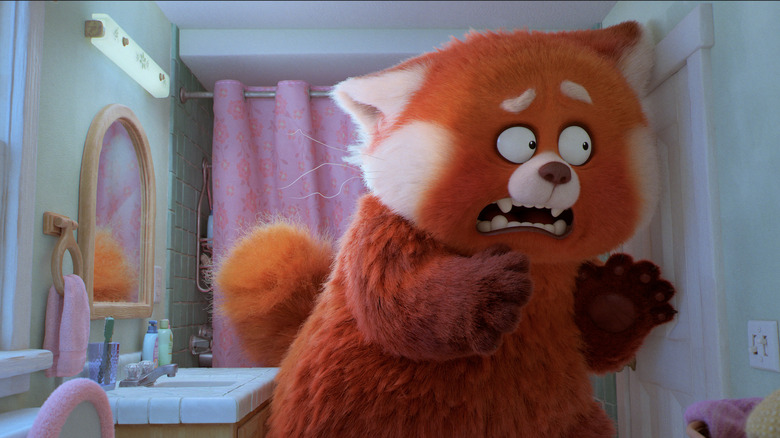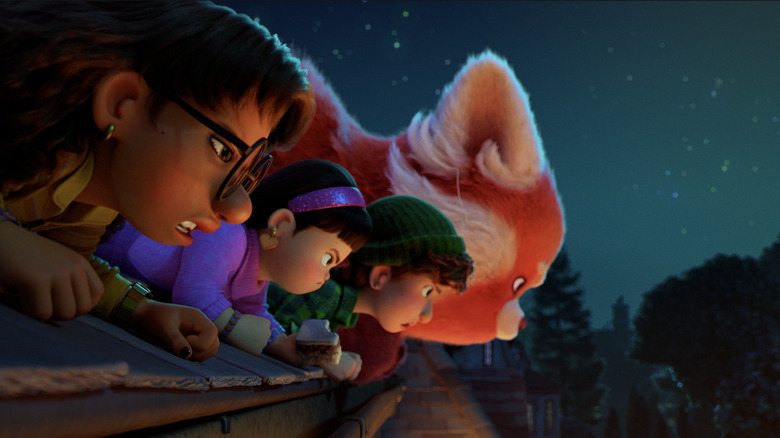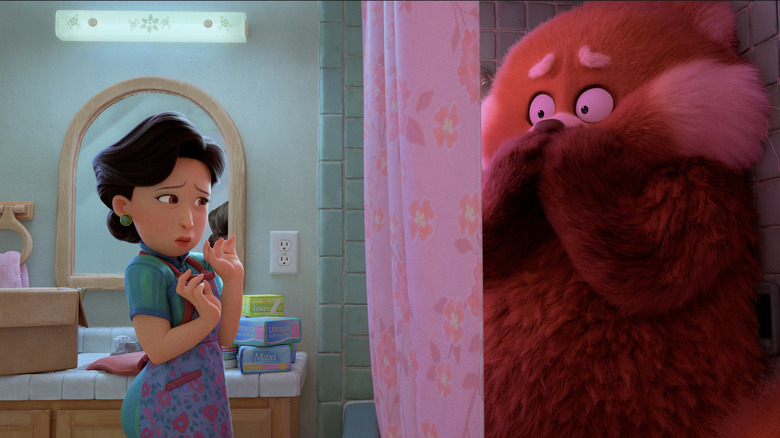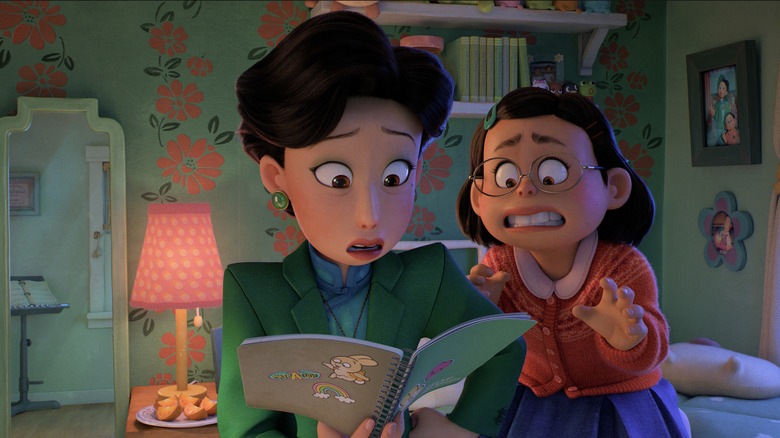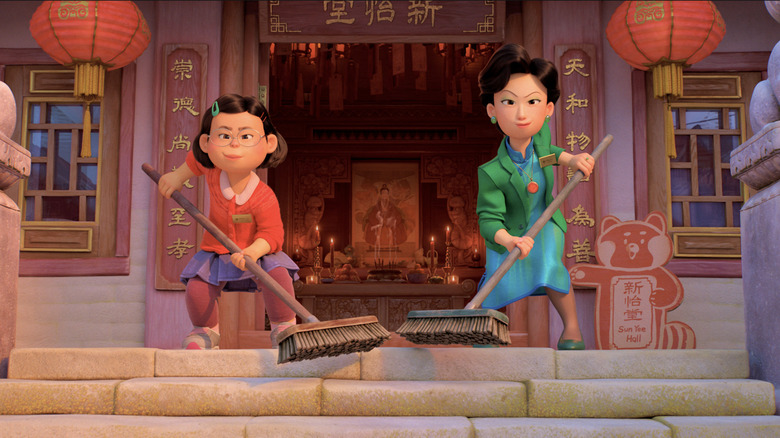Turning Red Director Domee Shi And Producer Lindsey Collins On Reliving Puberty And Learning To Love Your Teenage Self [Interview]
Pixar's newest feature "Turning Red" hits Disney+ on March 11, 2022, ready to transport us all to the persnickety and sometimes painful world of puberty. The film follows 13-year-old Mei Lee, struggling to find the balance between being her mother's obedient daughter, and the chaotic, boy-band obsessed teenager she's becoming. As if life wasn't already tough enough, Mei Lee awakens one day to discover that when her emotions get too big, she spontaneously transforms into a gigantic red panda. Not only is "Turning Red" the first Pixar movie to center on a teen girl protagonist, but the film is also the first from Pixar to boast an all-female leadership team. It's the Pixar personification of Ginger Spice screaming "Girl Power!" right down to the late '90s/early '00s aesthetic.
We sat down with director Domee Shi and producer Lindsey Collins to get to the heart of "Turning Red," and talk about how movies that center on teen girls are accessible for everyone, if you're willing to let yourself go there.
"I think we're going to be redefining what a universal story looks like."
Entertainment centered on tween and teen girls tend to be written off simply for existing, which is why films like "Ferris Bueller's "Day Off" are considered classics, but we still have to fight for the validity of something like "Clueless." How can a film like "Turning Red" help teach non-teen girl audiences how to see themselves in a story where they are not the star?
Shi: I think when non-teen girls watch the movie, they're going to be surprised at how much they relate to Mei and her struggles with her mom, and her identity and trying to figure out who she needs to be. And I think when people watch the movie, they will be surprised at how funny it is, because I know when we were showing it to people at Pixar, test audiences, the comment that we get over and over again is, "Oh my gosh, I didn't know girls could be funny," which is a weird thing to hear. But I think a lot of the humor and the heart will transcend the specificity of the movie. I think we're going to be redefining what a universal story looks like with this movie, which I think is really cool.
"Oh God, it was so awkward and painful."
Collins: I feel like one of the best gauges I feel like we have in our arsenal at Pixar is how we respond to our movies. I think, weirdly, our internal audiences, I think, we're as critical as the general public. You can feel it when something is working or not internally, and it tends to translate outside of these walls too. So I'm always reassured when we can show the movie to everybody at Pixar and have the type of response that we got–which is that people were laughing really hard, everybody was cringing in those moments universally, even if they were not necessarily related to the specific moment. Everybody was like, "Oh my God, I had a moment like that in school, or with my parents." That tween time is one that all of us don't want to revisit to some degree. "Oh God, it was so awkward and painful."
And yet obviously left such deep impressions for everybody that when they watch that on screen, you have them both in the sympathy for the character, but also in the humor of those moments and just how real it feels, those visceral feelings. So I do think that even if you're really distant from it, somehow those moments still resonate really deeply when you see them on a screen. My hope is, and our hope is, that it makes people feel like that commonality of that age, and remember it as viscerally as we tend to when we're watching it here.
"I always like to joke that instead of therapy I made a Pixar movie."
I'm really glad that you brought that up, because most people ... you couldn't pay them to want to revisit this time of their life, myself included. It takes a long time to make an animated feature, so what was it like having to spend years of your life back in that world and back in that mindset of cringe, chaos, hormones, and everything being awful ... and revisiting it willingly?
Shi: Sometimes unwillingly too! As you imagined it, it was tough and uncomfortable at times, but I think that's when you know you're hitting something gold. If it's something uncomfortable or something so cringey and embarrassing and maybe a little spicy, it gives me the sign that I need to put it in the movie, because it feels truthful. I always like to joke that instead of therapy I made a Pixar movie. And I think I learned a lot making it too, not just about myself, but also I was able to look back on my relationship with my mom when I was a teenager, and I was able to see things from a different perspective.
It was really funny, oftentimes in the story room I would come at the story from the teenager who thinks everything that her mom is doing to her is super unfair, so I had that bias. And then I was really lucky to have Lindsey in there who has teenagers who'll just come in and walk me from the edge and be like, "Okay, maybe the mom is not a monster, or maybe she's this way because she feels this way." And I was like, "Oh, that's a good point." So it was good to have another perspective in the room.
"This is such a painful time all around."
Collins: It's funny, even just moments in the movie that feel typical, where Mom is being dismissive of something [Mei] feels passionate about, like a boy band, the mom will be like, "What?" I have three teenagers, and I find myself doing that all the time. Even when I'm making this movie and being critical of the mom in the movie doing this, I find myself going home and being like, "Why do you want to go see that?" Or like, "Why do you want to buy that game?" and getting really critical of their passion and being dismissive of it. So in a weird way, I think too, it's a really good reminder that this is such a painful time all around. Every person who's dealing with somebody who's going through this, it's awkward and painful, and just the reminder of like, "No, no, no, this is natural. You're intended to fight with your parents this time. You're intended to be pushing boundaries." And as a parent, you have to just remind yourself like, "This isn't personal." As much as you're trying to avoid your kid growing up, this is part of it. It's weird.
And as painful as these stories are, everybody in the room, the minute Domee would be bold enough to put in something that was from her past, everybody started piling on with stories of like, "Oh yeah, that happened to me." A lot of those made it into the movie and they brought it to the performances. Those animators were able to bring all of those moments to the animation as they were animating these characters. As painful as it is, and as reticent as we are to visit our own moments, everybody was willing to put some of that on the screen.
"It's okay to feel like a hairy beast some days."
I love the willingness to allow that vulnerability of being a teenager all over again. Now that you're adults, what is one thing that you hope your inner 13-year-old can take away from this movie?
Shi: Oh, that's a good question. I hope that my inner 13-year-old realizes, when she watches the movie, that, all of these crazy emotions that I'm feeling, all of the messy changes in my life, to my body, to my relationship with my mom, and to my friends ... all of this is normal, even though it feels like every day that it's not normal, and that I will survive it and I will overcome it and get past it. And that it's okay to feel like a hairy beast some days. I hope she knows she can accept that part of herself and be kind to herself in that way.
Collins: I think for me, it's the reminder that those feelings, they don't go away. Because you do relate to it. You're like, "God, I still wake up some days and feel like I'm 13 years old again." I'm insecure going, "Who am I going to sit at lunch with?" Or, "Ugh, I hate the way I look right now." All of those insecurities and moments, as much as they're intense and concentrated during this time, and maybe it's the first time you're feeling all of them, they're still there. I think it's a good reminder that everybody has it. Everybody feels that way. And so that sense of, "Oh, I'm the only one feeling this way at any given time," is false, because we're all struggling with it always.
"Turning Red" releases on Disney+ on March 11, 2022.
